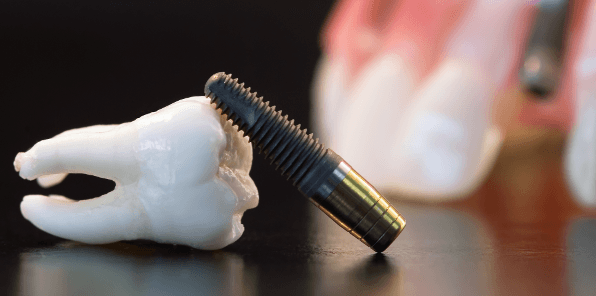What is the dental implant failure rate?

The success rate of dental implant treatment is just over 96%. This percentage comes from studies carried out over a five year period. Attempts to carry out studies over a longer period have proved problematic because of difficulties keeping patients in studies for a longer term.
Read more:
Dental implants: losing a tooth
The tooth of implant dentistry
Defining success
It also depends on the definition of success. For some researches success is qualified by the immediate results. That is the research looks at how many patients had implants placed and how successful the osseointegration process was. End of study. Other researchers quantify their results by the condition of the implant over a sustained period of time (i.e. 5 years).
And that’s all well and good for researchers and clinicians. But for patients those numbers could be skewed. After all, the success rate’s 96% but how many people were in that study? How many people made up the 4% of failure?
The general standard for success is the survival of the dental implant. But there’s no set list of “what constitutes an implant failure.” Simply because it could be at the level of clinician, the health of your jaw, whether you smoke or not, gum disease; or how well you look after your oral health. Each one of these then raises other questions, brings into consideration other factors and so the possible reasons for implant failure continue to increase.
What contributes to the dental implant failure rate?
Dental implant failure is uncommon. Mostly thanks to the new dental implant technology as well as the skill of the Brisbane Dental Implant Group team. There are in fact a number of key reasons why dental implants fail. Three of those reasons are:
- Presence of tooth decay or gum disease
- Smoking
- Pre-existing medical conditions
Gum disease is the leading cause of tooth loss in adults, and can influence the tissue around the implant. What this can do is cause difficulty during the osseointegration process.
Smoking is one of the largest contributors to dental implant failure. While some dentists and oral surgeons refuse to treat smokers because of the high implant failure rate, we ask patients to stop smoking a few weeks before treatment and wait at least two weeks after surgery before continuing. If you continue to smoke it has the potential to cause gum inflammation which can cause the implant to fail.
Medical conditions such as diabetes can cause inflammation which often results in the dental implant having trouble bonding to your jawbone.
What contributes to dental implant success?
Healthy jaw, healthy gums and a healthy body are all contributors to successful dental implant treatment. On top of that, maintaining a good oral hygiene routine post-treatment is just as important.
While it is true dental implants cannot suffer from decay, they can suffer from peri-implantitis: this is essentially gum disease for dental implants.
At the end of your implant treatment at Brisbane Dental Implant Group one of our hygienists will show you the best way to care for your dental implant. We also strongly recommend you maintain 6 month dental check-ups so your dentist can ensure your continued oral health.
If you would like to know more about dental implants, and if they are right for you, please contact Brisbane Dental Implant Group.




